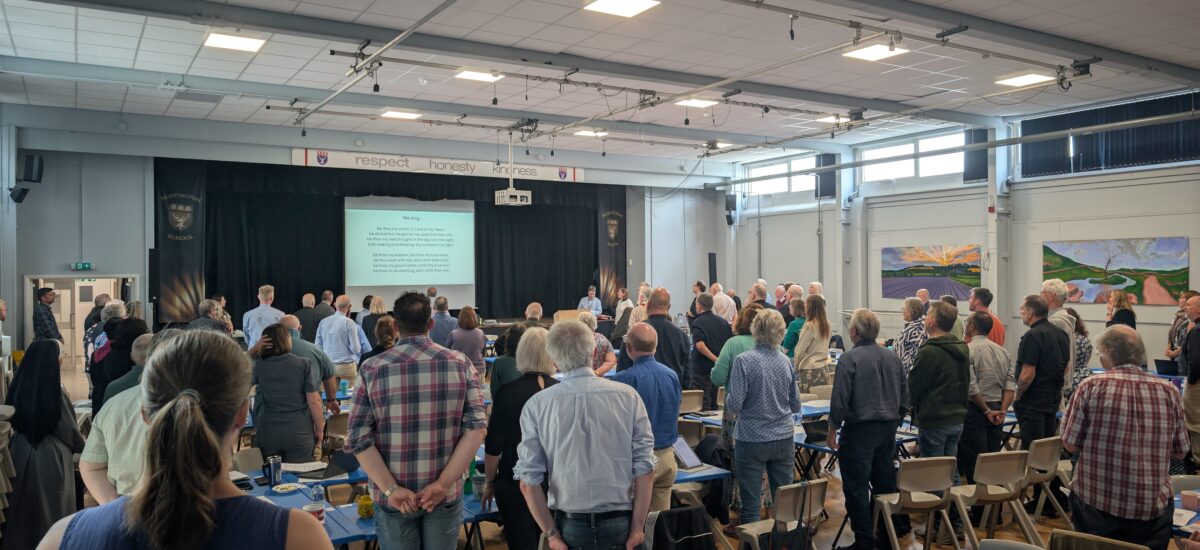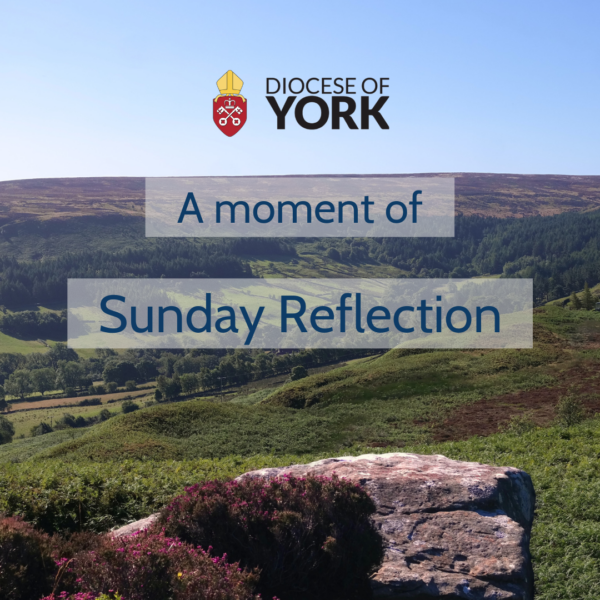Synod met at Huntington School, York, on a warm day at the start of summer.
Presidential Address
Archbishop Stephen began his presidential address by giving thanks for the lives of two members of Diocesan Synod who have died since its last meeting, Helen Goodman and the Revd Richard Hare.
“This year, I celebrated – or perhaps ‘marked’ would be a more accurate word to describe it – 21 years as a bishop. Every time I license a new priest, or do something formal and legal, I am reminded of my longevity – when I say at the end of every legal document: ‘the 21st year of my consecration and of my translation, the 5th’.
“21 years ago, the issue convulsing the Church, and a painful and testing situation I found myself thrust into, was Jeffrey John withdrawing as Bishop-designate of Reading. A replacement was needed. I was asked to take on the role. On the day my appointment was announced, the press conference at Reading Minster. The press conference lasted two hours and was live streamed on television. 21 years ago, being – or not being – the Bishop of Reading was a big story. The Church was divided on how to receive and celebrate the presence in our congregations and the ministry of people in stable, committed same-sex relationships. I answered a lot of questions that day, committing myself to be a bishop for all the people in parishes of the Reading episcopal area and saying I believed that this was not an issue that should divide the Church; that I respected and valued the conscientiously-held theological convictions of those who saw the issue differently; and even dared to believe that if we could find ways of living across this difference, it would be a tremendous gift, not just for the Church, but to a far too easily divided and conflicted world.
““One detail of the story that it is good to have the opportunity to put on public record 21 years later, is that Jeffrey John himself also issued a press statement that day, graciously welcoming my appointment and wishing me well in my ministry. This didn’t get media coverage. It didn’t fit the narrative. But it showed what a good and godly man Jeffrey John is.
“… I know that these discussions touch on deeply held convictions and I’m also mindful that for some of us in the room it is our own identity which feels under discussion. Let us then love one another, let us seek the mind of Christ, and let us be in no doubt: each of us is very welcome in the house of God.”
Safeguarding Annual Report
Allan Harder, the Independent Chair of the Diocesan Safeguarding Advisory Panel (DSAP), presented the report on safeguarding in the diocese through 2024.
Allan spoke about the work of the Survivor Voice Working Group (SVWG), explaining its rationale, its membership, and some of the positive outcomes the group has affected.
Allan reflected on the INEQE audit of the diocese’s safeguarding practices which was conducted in March 2025. He explained the process of preparing for and participating in the audit. Allan encouraged all members to read the audit report thoroughly (once published – anticipated soon), and to reflect on what it means for themselves individually, and for their parishes.
Stokesley Deanery Synod Motion
Roy Parsonage (Parish Safeguarding Officer in Stokesley Deanery) presented the motion. He expressed the unease from some about the Church of England’s public image and the response from leadership to safeguarding issues.
Members, including the Archbishop, were largely in favour of the motion, though some found the language too critical of those currently in leadership. Questions and comments from the floor praised the safeguarding team, and reminded members that there are many positive outcomes to safeguarding concerns, but they may not be communicated due to confidentiality. The motion passed with 6 votes against and 4 abstentions.
Living in Love and Faith (LLF)
The Revd Nikki Eastwood (Area Dean of Easingwold) led an introduction to the LLF process. She explained that the feedback from synod would be taken back to the national church to aid the ongoing discussions.
After 40 minutes of structured discussion on tables, group facilitators fed back. Comments centred on some main themes:
- The need for transparency and openness
- A hope for unity
- A willingness to engage congregations more
- A recognition that this is not a binary debate
Archbishop Stephen closed the conversation, assuring members of each bishops’ desire to ensure every person/parish feels valued.
Annual Report and Accounts 2024
Kathryn Rose (Diocesan Director of Finance) presented the diocese’s annual report and accounts for 2024. The final results show the we have an operational deficit of £1.7m, which is slightly better than what was forecast,. The reduction is due to a higher number of vacancies, better investment performance and rental income, and lower housing costs due to planned works moving into 2025.
The actual total deficit improves to £654,000 after a temporary saving from the Lay Pension Usable Surplus, though this will run out in the next 2-3 years.
2025 Financial Update
Kathryn Rose gave a financial update for 2025. She explained that the 2025 deficit is due to be over £2m, before any investment gains.
Kathryn spoke about the ongoing work of monitoring our financial situation. She explained this year’s approach to the Free Will Offer, and how the rising costs of ministry need to be met. Synod unanimously accepted the report and accounts.
Audit Committee Report
Robert Woolley (member of the Finance Committee and Audit Committee) presented the Audit Committee’s report. The committee raised no concerns and are happy with the diocese’s finances overall.
Whilst there are quite a few restricted funds, the unrestricted fund deficit needs to be addressed. The committee is helping with this, for example with a Total Returns Policy for Investments. Synod unanimously accepted the report.
Feedback from Youth Observers
Four observers aged 18-25 joined synod for the day. Bishop Barry introduced them, reminding synod of the diocese’s vision to grow younger and more diverse. Morgan, Maia, Christian, and Emily, spoke about their gratitude for being invited.
They reflected on the importance of listening to young voices, investing in youth workers, and encouraging participation in church governance.
Living Christ’s Story Update
Bishop Flora introduced this item, giving an overview of Programme Board meetings and praising the appointment our new Head of Programme Delivery, Mark Scott.
Heather Black (Mustard Seed Programme Director) gave an update on Mustard Seed’s work. In the 5 years since its inception, Mustard Seed has grown extensively.
Heather told the stories of four people who have completed Stepping Up, an experiential learning programme aimed at equipping lay people for mission. She shared Mustard Seed’s three key priorities; investing in local people to grow and stay local, fostering churches as community hubs where faith is shared, and committing to sustainability.
Education Annual Report
Mari Palmer (Diocesan Director of Education) presented this report, noting that much of the work had taken place before her appointment in the spring term of 2025.
Mari thanked former members of the education team, Bishop Paul, Andrew Smith, and Claire Graham-Brown, for their contributions. Synod unanimously accepted the report.

